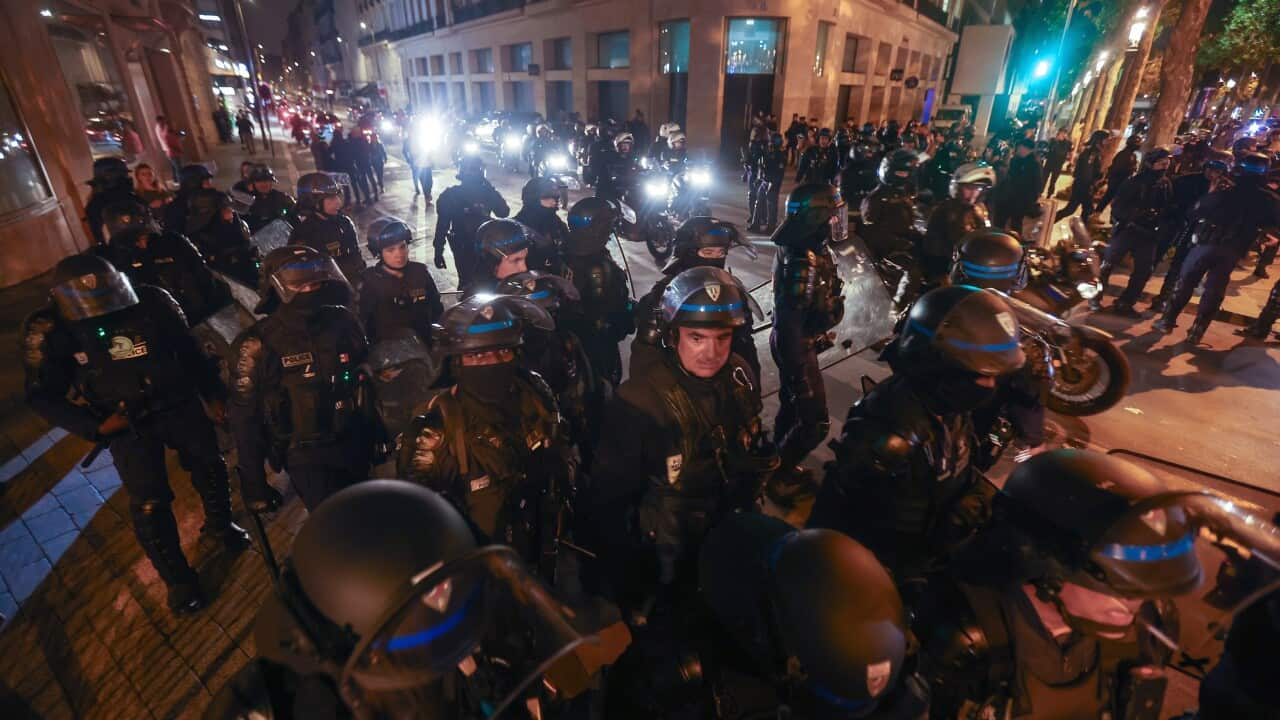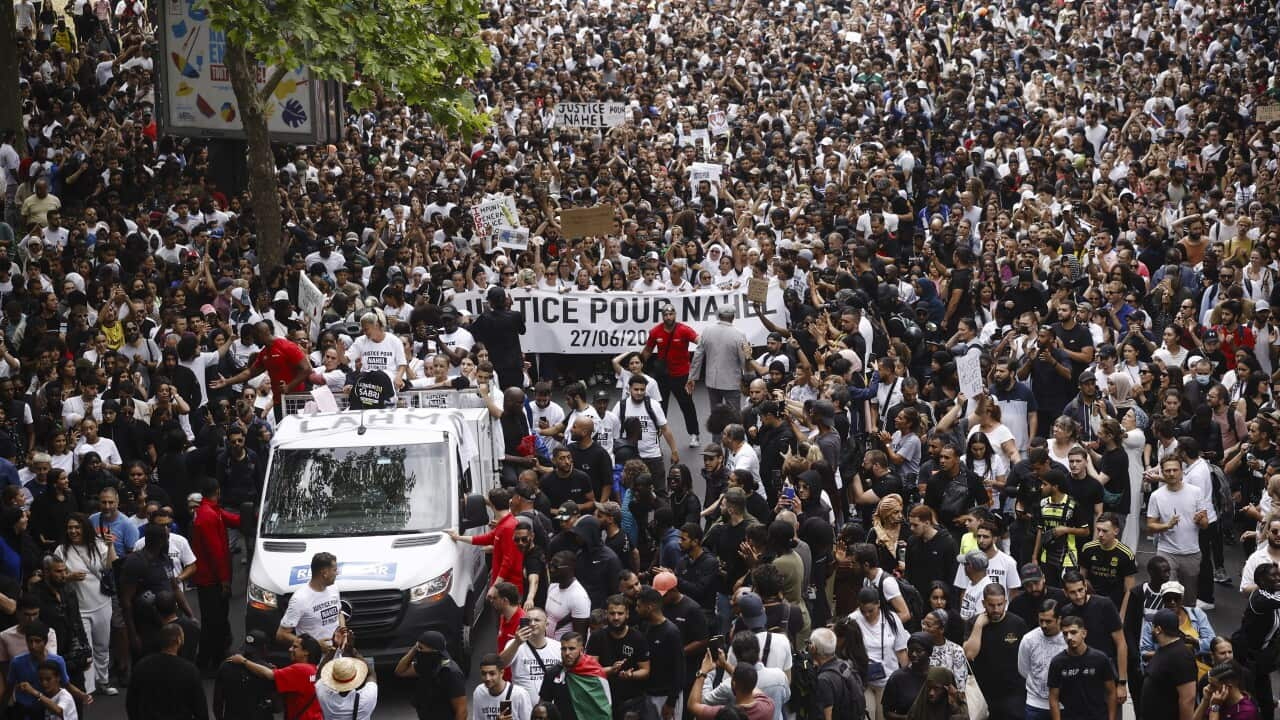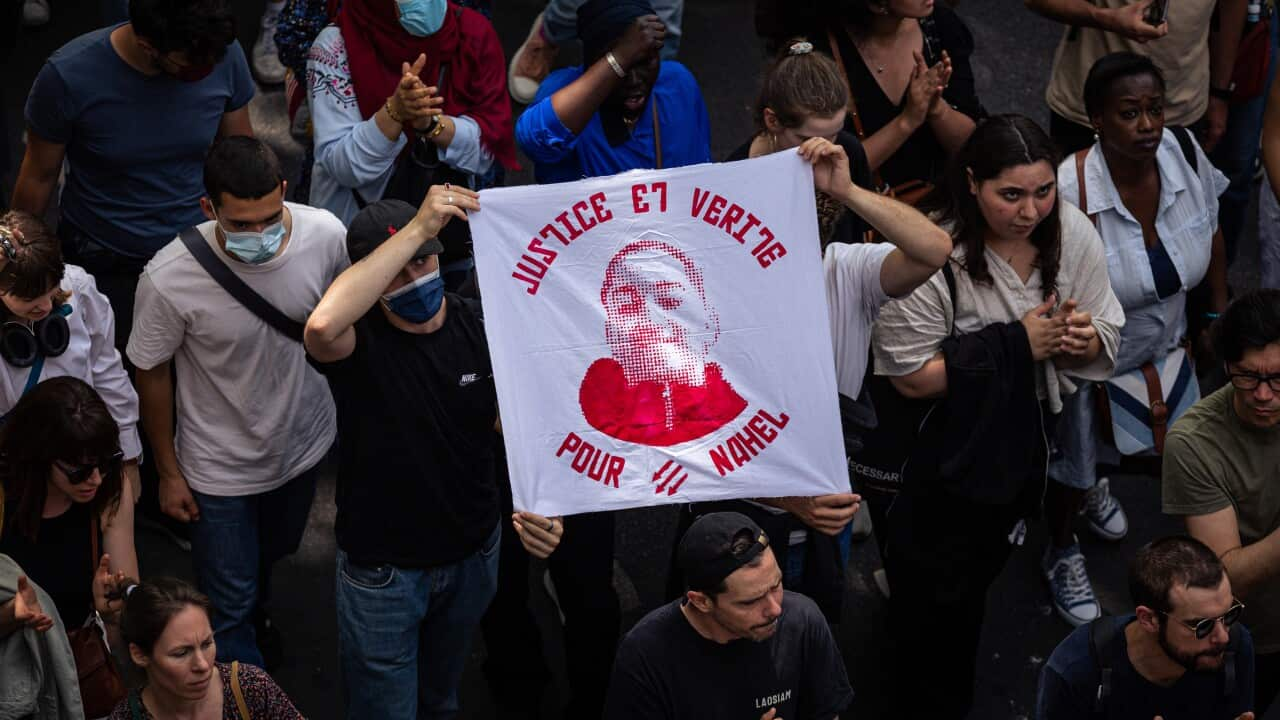Key points
- French police have made hundreds of arrests on a fifth night of unrest.
- Rioters rammed a car into the home of a mayor, injuring his wife and child.
- Nahel, the teenager whose shooting sparked the protests, has been laid to rest in Paris.
French authorities have made hundreds of arrests as rioters rammed a car into the home of a mayor on the fifth night of unrest sparked by the fatal police shooting of a 17-year-old, who was laid to rest the day before.
A total of 719 people had been arrested across France, the interior ministry said.
At around 1.30am local time (9.30am AEST) rioters drove a car into the home of the mayor of a town south of Paris, injuring his wife and one of his children, the mayor said on Sunday.
Mayor Vincent Jeanbrun wrote in a statement posted on Twitter that protesters "rammed a car" into his home, before trying to set the house on fire.
"My wife and one of my children were injured," he said.
"My determination to protect and serve the Republic is greater than ever," he added. "I don't have strong enough words to describe how I feel faced with this night's horror."
Interior Minister Gerald Darmanin had told reporters earlier that 45,000 members of the security forces would be deployed overnight, the same number as the night before.
Extra forces and equipment were sent to Lyon, Grenoble and Marseille, which had previously seen intense rioting.
The death of the teen simply known as Nahel in the Paris suburb of Nanterre on Tuesday has sparked riots in a country where police have long faced accusations of singling out minorities.
Who was Nahel and what happened to him?
Nahel, who had no criminal record, grew up on an estate called Pablo Picasso in Nanterre, a Parisian suburb home to many immigrants.
His mother, whose family is from Algeria — a former French colony that has contributed most of North Africa's immigration to France — raised him alone.
Nahel's funeral ceremony was held in the Paris suburb of Nanterre, with hundreds gathering peacefully along with his mother and grandmother.
A ceremony took place in the early afternoon at the mosque in Nanterre with the interment taking place in the giant Mont Valerien cemetery in the area.
The event was marked by "reflection and without incidents", a witness told AFP.

Mourners arrive at the Mont Valerien cemetery for the burial of Nahel M, a 17-year-old boy of Algerian origin shot by a policeman in Paris. Source: AAP / ABACA/PA/Alamy
The UN rights office said Friday that the killing of the teen of North African descent was "a moment for the country to seriously address the deep issues of racism and racial discrimination in law enforcement".
The French foreign ministry dismissed the criticism, saying any suggestion of systemic discrimination in the police force was "totally unfounded".
Are the riots a big problem for Emmanuel Macron?
The crisis is a hugely unwelcome development for President Emmanuel Macron, who was looking forward to pressing on with his second mandate after seeing off months of protests that erupted in January over raising the pensions age.
In a sign of the seriousness of the crisis, he postponed a state visit to Germany scheduled to begin Sunday.
The Elysee said that Mr Macron had expressed his wish to remain in France in the coming days, given the situation in the country.
The French president has urged parents to take responsibility for underage rioters, one-third of whom were "young or very young".
Justice Minister Eric Dupond-Moretti said Saturday that 30 per cent of those arrested were minors, while Mr Darmanin said the average age of those arrested was just 17.
What's happening now?
In Paris and its nearby regions, 7,000 officers were out in force on Saturday evening. On the Champs-Élysées, home to a string of luxury shops, riot police kept an eye on black-clad youths as they walked the avenue.

Riot police forces clash with demonstrators near the Arc de Triomphe during another night of clashes with protestors in Paris. Source: AAP / Mohammed Badra/EPA
In Marseille, police dispersed groups of youths Saturday evening at Canebiere, the main avenue running through the centre of the city, AFP journalists said.
By midnight, the authorities in Lyon and Marseille were reporting fewer incidents than the previous night.
A number of towns have imposed overnight curfews.
How has the community responded?
In a bid to limit the violence, buses and trams in France have stopped running after 9pm local time and the sale of large fireworks and inflammable liquids has been banned.
In the southern port city of Marseille, home to many migrants from North Africa and the scene of many clashes, authorities are going a step further by halting all urban transport from 6pm, including metros, and banning all protests up until Sunday.

Mounia, mother of the French teenager killed by police, attends a memorial march for her son Nahel. Source: Getty / Abdulmonam Eassa
In a rare intervention on a social issue, the French national football team, many of whose top players are of minority background, joined calls for an end to the clashes.
"The time of violence must give way to that of mourning, dialogue and reconstruction," the team said in a statement posted Friday on social media by captain and Paris Saint-Germain superstar Kylian Mbappe.
What has the reaction been inside and outside France?
The unrest has raised concerns abroad, with France hosting the Rugby World Cup in the autumn and the Paris Olympic Games in the summer of 2024.
On Saturday, Smartraveller updated its advice to Australians considering travelling to France to: "Exercise a high degree of caution".
"Be particularly vigilant at night and avoid all demonstrations and areas with significant police activity. Curfews have been introduced in some cities. Public transport may be restricted or cancelled. The situation may change at short notice. Monitor the media and official sources for updates," the advice read.
Britain and other European countries have also updated their travel advice to warn tourists to stay away from areas affected by the rioting.
The unrest has had a major impact on cultural events in France with singer Mylene Farmer forced to cancel stadium concerts and French fashion house Celine cancelling its menswear show in Paris scheduled for this weekend.
Several cultural events have been cancelled due to the riots, including two concerts at the Stade de France by one of the country's most popular singers, Mylene Farmer, and the last night of the Fnac Live festival in the capital.
French fashion house Celine has cancelled its menswear show in Paris this weekend due to ongoing riots sparked by the police killing of a teenager, designer Hedi Slimane said Saturday.
The cancellation will raise questions for other fashion houses, since Paris is set to host the haute couture week starting from Monday.



